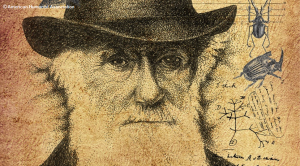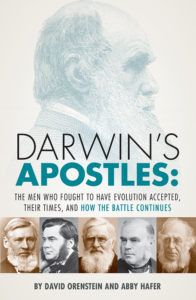Evolution Talks and Banana Splits

Darwin Day, celebrated on Charles Darwin’s birthday on February 12, is a time “to ensure that children are being taught scientific facts, not religious dogma, and to fight back against those who seek to undermine the science of climate change for political ends.” So said Representative Pete Stark (D-CA) back in 2011 when he proposed House Resolution 81 calling for the designation of February 12 as Darwin Day. (Humanists will have seen the news of Stark’s death on January 24.) Today the American Humanist Association (AHA) is working with other members of Congress to introduce a resolution in the House and Senate to designate February 12, 2020, as Darwin Day. Humanists, Darwin enthusiasts, and science supporters are encouraged to contact their federal representatives to ask them to sign onto the resolution as co-sponsors once it’s introduced.
 Along with our work on Capitol Hill, the AHA is looking forward to celebrating Darwin Day 2020 with Darwin’s Apostles authors David Orenstein and Abby Hafer. They’ll be joining our monthly speaker series to tell how Darwin’s colleagues “launched a campaign for truth that, despite powerful opposition, largely succeeded.” Orenstein will focus on how Darwin’s work inspired a global pursuit of humane understanding of our world and continues to impact our activism. Hafer will examine how our current battle against fake news can be greatly influenced by the lessons learned by evolutionary biologists throughout history. If you’re unable to join us at the AHA headquarters in Washington, DC, on Wednesday, February 12, you can join us through Facebook Live. We’ll be taking questions through the comments section.
Along with our work on Capitol Hill, the AHA is looking forward to celebrating Darwin Day 2020 with Darwin’s Apostles authors David Orenstein and Abby Hafer. They’ll be joining our monthly speaker series to tell how Darwin’s colleagues “launched a campaign for truth that, despite powerful opposition, largely succeeded.” Orenstein will focus on how Darwin’s work inspired a global pursuit of humane understanding of our world and continues to impact our activism. Hafer will examine how our current battle against fake news can be greatly influenced by the lessons learned by evolutionary biologists throughout history. If you’re unable to join us at the AHA headquarters in Washington, DC, on Wednesday, February 12, you can join us through Facebook Live. We’ll be taking questions through the comments section.
We’re also excited to share Darwin Day events across the country hosted by some of our local chapters and affiliates.
Baltimore Ethical Society is partnering with the Second Wednesdays Speaker Series of the Village Learning Place and the Baltimore Coalition of Reason to celebrate with a presentation by Professor Jonathan Pevsner on Wednesday, February 12. Pevsner will talk about Leonardo Da Vinci’s integration of art and science and his influence on Charles Darwin. The event will include a pizza lunch.
Wild Wonderful Humanists of Morgantown, West Virginia, are taking over 123 Pleasant St—café by day and nightclub by night—on February 12 to host Golden Apple award-winning Professor Richard Smosna. Smosna is a retired professor of geology who will discuss the “Pitfalls of Science” and its self-correcting and self-critiquing function. Wild Wonderful Humanists is excited to add a free lunch to their event this year, provided by a generous grant from the AHA. Contact Timothy Nelms for more details on the event.
Fred Edwords, former executive director of the American Humanist Association and former editor of the Humanist magazine, will be giving a talk on “Why the Science of Human Evolution Matters Now” on Sunday, February 16, at the Northern Virginia Ethical Society in Vienna, Virginia. “The study of human evolution isn’t just an exercise in looking backward at old bones,” Edwords explains, “it tells us who we are today and who we may be tomorrow. The most telling discovery in this field is that humanity’s impact on planet Earth has become so great that it will be reflected in the fossil record.” Stick around after his talk to enjoy banana splits and other treats.
Humanists of Utah invite you to “join fellow geeks, dinophiles, and cake lovers for a fun afternoon celebrating Darwin’s Birthday” on Saturday, February 15, at the Museum of Ancient Life at Thanksgiving Point in Lehi, Utah. Their event will include two talks: “T-REX Family Values” by Paul J. Bybee from Utah Valley University and “Myrmecophily: Ants and the Species That Love Them” by Marissa Harrison, chief entomologist for the Butterfly Biosphere. There will also be lots of games and treats for children to enjoy.
The Ethical Humanist Society of Long Island will welcome John Teehan, professor and chair of the Department of Religion at Hofstra University, on Sunday, February 9, to discuss “The Search for Meaning and Faith in a Darwinian World.” He will explore how our understanding of the natural world and our place in it has changed since the 1859 publication of Charles Darwin’s On the Origin of Species. “Far more damaging than simply refuting the Genesis account of creation, Darwin’s view of nature as an evolving dynamic process, which was neither guided nor designed, raised the specter of nihilism,” Teehan explains. “I will argue that by fully embracing the lessons of Darwin’s view of life we will discover the resources for creating a meaningful, morally rich existence—and for a faith that may sustain us in these troubled times.”
The group Atheists and Other Freethinkers in Sacramento, California, helped establish the local Darwin Day celebration twenty-three years ago and continues to support the city’s “most go-to event of science and human reason, brought to you by science advocates, civic groups, and nerds on too much coffee.” On Sunday, February 9, Sacramento Darwin Day 2020 will include a talk by journalist and historian Salvatore John Manna on “Glorious Trees: Alfred Russel Wallace in California,” sharing how Wallace developed the cornerstone of natural selection and the theory of evolution around the same time as Darwin.
While Sacramento continues its longstanding traditions, the Chicago Humanists are starting a new one with their first Chicago Darwin Day Fundraising Dinner on Wednesday, February 12. They’re welcoming local humanists to enjoy delicious food, good conversation, and a fun auction.
For more on Darwin Day visit darwinday.org.
